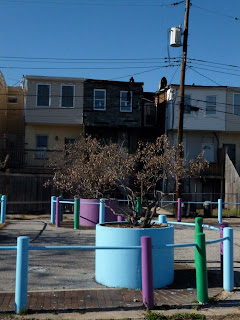Wednesday, March 28, 2012
Jason Reed - Filbert Street Garden
Jason decided to start a garden in Baltimore for personal reasons but mostly due to it feeling like the right thing to do. He wanted to have more space, access to open air as well as access to fresh food. Jason lived in Westport which is a community that mirrors Curtis Bay--the neighborhood that houses Filbert Street Garden. In Westport and Curtis Bay there is no access to food at all so healthy food is extremely hard to find. Being able to make healthy food available in urban areas was his greatest motivation for starting a community garden.
Jason began his first garden in Westport while he was a music teacher. Curtis Bay was interested in Jason taking over an existing garden as well as adding on an education component. Jason learned that community involvement is what makes a difference when establishing a garden. Those who are interested in gardening typically have gardening space available in their backyard but the educational component made Filbert Street a different gardening experience. Once the community learned about the educational component the community support for the garden blossomed.
Jason would like to leave new gardeners with a few words of advice: Do what you know is right for the community/garden, follow your spirit and start early because the process can take a long time.
Good luck and happy gardening!
To find out more about Filbert Street Garden please check out their blog.
Monday, March 12, 2012
The 6th Branch, 1500 Bethel St Garden

The 6th Branch is a 501(c)3 nonprofit organization based in Baltimore City that utilizes the leadership and organizational skills of military veterans to create and lead aggressive community service initiatives. Founded by a small group of OEF/OIF veterans, The 6th Branch executes community service projects with the same intensity, urgency, and efficiency of a combat operation.
The 6th Branch has paid for the design and completion of two murals in the Oliver neighborhood, and have had a series of large scale neighborhood clean-up events (upwards of 100 volunteers each time) that has resulted in more than 50 tons of garbage and debris removed. Several trees have also been planted as part of the neighborhood greening portion of Operation: Oliver.


The garden on the 1500 block of N. Bethel Street will incorporate primarily native and native-hybrid trees, shrubs, and perennials. This garden will help reduce stormwater run-off by taking a formerly vacant and trash strewn dumping site into a garden that will soak up excess rainwater and provide a habitat for wildlife. Birdhouses, painted by children and volunteers will be lead by volunteers from the Veteran Artist Program. The garden will help reduce crime and help to increase property values of the adjacent homes which will then overlook this park, but giving the neighborhood a sense of pride and ownership. Seeing the neighborhood greening efforts in this way will also attract potential homebuyers to the area, thus staying in line with Mayor Stephanie Rawlings-Blake's initiative of 10,000 Families.
Thursday, March 1, 2012
The 2012 Urbanite Project!
Roughly two-thirds of the city’s adults and nearly 40 percent of high school students are overweight or obese. What’s worse, major disparities exist between the obesity rates of whites and blacks, people with and without college degrees, and households making more and less than $25,000 a year. A recent Baltimore City report found that 43 percent of residents in the city’s predominantly black neighborhoods have very limited access to healthy food, compared with just 4 percent of predominantly white neighborhoods.
Introducing Urbanite Project 2012: Healthy Food Challenge. We’re inviting teams or individuals to compete for $12,000 in prize money (provided by our partners, the Baltimore City Health Department, the Maryland Department of Agriculture, United Way of Central Maryland, and Stratford University) to answer the question: How can we make Baltimore healthier?
This year, Urbanite, in association with the Baltimore City Health Department, the Maryland Department of Agriculture, United Way of Central Maryland, and Stratford University, aims to improve residents’ access to healthy food, citywide. Urbanite Project 2012: Healthy Food Challenge calls for creative, innovative, non-traditional ideas that address one or more of the barriers to affordable, healthy food for Baltimore City residents living in neighborhood food deserts. Food deserts, as defined by the Johns Hopkins Center for a Livable Future, are residential block groups more than a quarter-mile from a major supermarket and where 40 percent of the population’s household income is below $25,000. The barriers are varied and numerous—transportation, a lack of healthy food at nearby stores, education, food preparation, and time, among other factors, all contribute to the problem.
This year’s Urbanite Project aims to improve residents’ access to healthy food, citywide. Whether it’s a vegetable garden in a vacant lot, an after-school cooking class for high school students, or a supermarket delivery service, the solutions are out there. We think that if we can level the playing field, foodwise, we have the potential to unite an otherwise divided city, on other levels.

[Information retrieved from The 2012 Urbanite Project]
Working with Power in Dirt is one of the many ways that you can help provide access to healthy food in Baltimore. Since Power in Dirt focuses on the revitalization of city owned vacant lots you are able to adopt a lot and start a vegetable garden in your neighborhood which will allow your community to have access to fresh produce!



